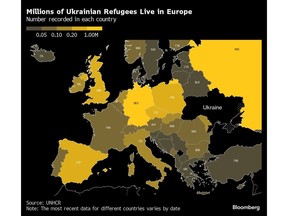Article content
(Bloomberg) — Chair Jerome Powell said the time has come for the Federal Reserve to cut its key policy rate, affirming expectations that officials will begin lowering borrowing costs next month and making clear his intention to prevent further cooling in the labor market.
“The time has come for policy to adjust,” Powell said Friday at the Kansas City’s Fed’s annual conference in Jackson Hole, Wyoming. He acknowledged recent progress on inflation and an “unmistakable” slowdown in the labor market.
Article content
Here are some of the charts that appeared on Bloomberg this week on the latest developments in the global economy, markets and geopolitics:
US & Canada
While Powell’s remarks provided some clarity for financial markets in the near term, they offered few clues as to how the Fed might proceed after its September gathering. Still, the speech confirmed the US central bank is on the cusp of a key turning point in its two-year battle against inflation.
US job growth will likely be revised down by 818,000 for the 12 months through March, the largest downward revision since 2009. The Bureau of Labor Statistics provided at least three Wall Street firms with the highly anticipated number that was delayed on the agency’s website, renewing questions about the procedures for disseminating some of the world’s most sensitive economic information.
The busiest port complex in the US is churning through import volumes near the highs set during the pandemic despite worries about a cooling economy. Demand now is driven by retailers and other importers that are stocking up ahead of US tariffs on Chinese goods and a possible strike by a large group of American dockworkers — adding to the usual frenzy of pre-holiday ordering that occurs this time of year.
Article content
A union filed strike notice against Canada’s largest railway on Friday just hours after trains began rolling again, likely derailing plans to revive vital shipping networks. The Teamsters Canada Rail Conference told Canadian National Railway Co. in a letter that it plans to withdraw the services of its roughly 6,500 members effective 10 a.m. Toronto time on Monday.
Europe
The euro-area economy got an unexpectedly strong boost from the Paris Olympics, which propelled private-sector growth to the fastest pace in three months. Much suggests the Olympic spirit won’t linger — not even in France, where growth momentum picked up sharply this month. Output in Germany, Europe’s largest economy, shrank more than expected.
Ukrainian President Volodymyr Zelenskiy wants refugees to return to keep the war-torn economy running and resist Russia. Much of central and eastern Europe, meanwhile, is enduring a labor shortage, and countries such as Poland and the Czech Republic are reticent to lose people.
Asia
South Korea’s household debt grew at a quickening clip last quarter, spurred by mortgage loans. South Korea has one of the highest household debt-to-economy ratios in the world, with many people holding the bulk of their wealth in real estate.
Article content
Singapore’s core inflation slowed more than expected in July, opening the room for the island’s central bank to consider loosening monetary policy settings later this year.
Chinese consumers continued to pull back on gold purchases last month, as record prices and a sustained economic slowdown curbed demand in the world’s biggest bullion-buying nation.
Emerging Markets
It’s been almost two years now since Luiz Inacio Lula da Silva secured his return to power in Brazil. For investors, they’ve been bleak — a stark contrast to Lula’s first presidential stint two decades ago. He’s balked repeatedly at calls for spending cuts to rein in a budget deficit that has ballooned to the equivalent of about 10% of Brazil’s gross domestic product.
Mexico’s annual inflation slowed much more than expected while economic growth remained feeble. The data clear the way for Banxico, as the Mexican central bank is known, to deliver a second-straight rate cut of a quarter-point at its September meeting.
World
Sweden’s Riksbank lowered rates for the second time since May, and Botswana cut as well. Turkey held rates steady for a fifth month. Chinese banks kept their benchmark lending rates unchanged for August as profit margins come under pressure, while Iceland, Thailand, Indonesia, Korea and Paraguay held.
—With assistance from Vinícius Andrade, Krystof Chamonikolas, Laura Dhillon Kane, Andrea Dudik, Sybilla Gross, Sam Kim, Cynthia Li, Jonnelle Marte, Monique Mulima, Natalia Ojewska, Amara Omeokwe, Jana Randow, Andrew Rosati, Augusta Saraiva and Alex Vasquez.
Share this article in your social network

